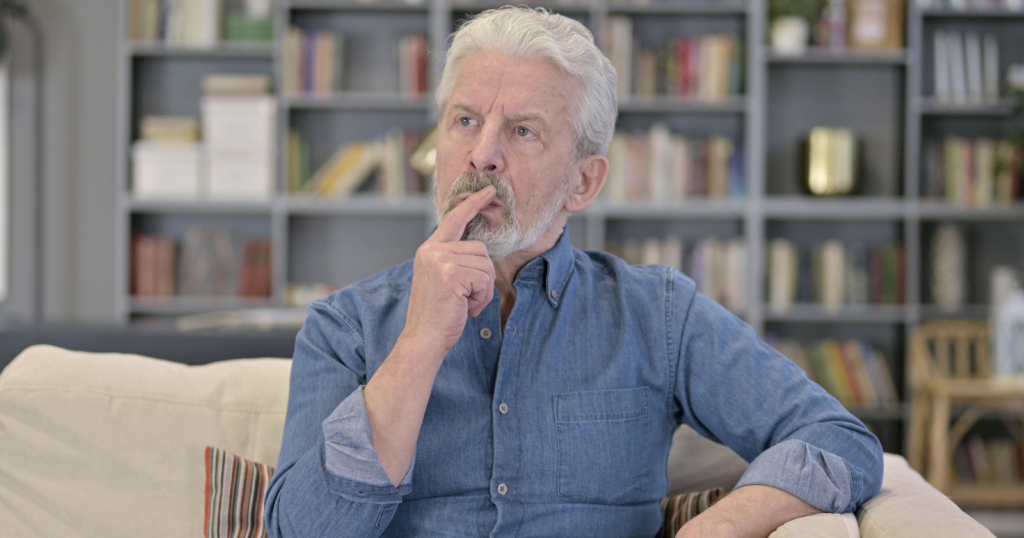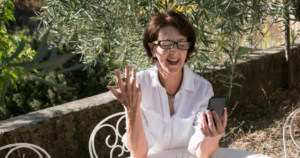It’s a tough pill to swallow, isn’t it?
You’ve known someone for years, perhaps even decades. They used to be your rock, a constant source of comfort and wisdom in your life.
But lately, something’s changed. They seem… harder. More difficult to deal with. And it’s not just you who’s noticed.
You’ve tried to brush it off, chalked it up to age or stress. But deep down, you can’t shake that feeling of unease. You’re starting to dread conversations and interactions that used to bring you joy.
Perhaps there isn’t a grand showdown or a massive revelation.
It’s more like a slow, creeping realization that the person you once knew is becoming increasingly toxic and difficult as they get older.
And the real kicker? They have no idea they’re changing.
Now, I’m not saying this to scare you or make you paranoid about every little shift in someone’s personality.
What I am saying is that there are certain habits people often adopt as they age that could make them more toxic, even if they don’t realize it.
In this article, we’re going to delve into these habits – not to point fingers or lay blame, but to enlighten and inform.
Understanding these habits can help us navigate our relationships better, facilitate more meaningful conversations, and perhaps even help those who are unknowingly becoming more difficult.
Let’s dive in.
1) They develop a habit of constant criticism
It can be a real punch in the gut.
You’ve always known this person to be supportive, perhaps even a cheerleader in your life. But now, every word that comes out of their mouth seems to be laced with criticism.
Suddenly, it’s as if nothing you do is good enough. Your achievements are downplayed, your efforts belittled. And the worst part? They probably don’t even realize they’re doing it.
As people age, they sometimes adopt a habit of constant criticism, often under the guise of ‘constructive feedback’.
But when every conversation leaves you feeling like you’ve been through a shredder, it’s more than just feedback – it’s toxic.
This shift can happen for various reasons – insecurity, unfulfilled dreams, or simply a misguided attempt to help others improve.
Regardless of the reason, it’s important to recognize this habit for what it is – not necessarily a reflection of your worth, but a sign that the person may be becoming more difficult with age.
2) They begin to dismiss other’s feelings
Now here’s a tough one.
You’re sharing something personal, something that really matters to you.
But instead of the empathy or understanding you’ve come to expect, they brush it off. Your feelings, it seems, have become inconsequential.
Take my own experience, for instance. I remember sharing with an old friend about a difficult situation I was going through.
Instead of offering comfort or advice, she simply said, “Well, that’s life.” Her dismissive attitude hurt me more than the issue I was dealing with.
When people unknowingly become more toxic as they age, they often start dismissing the feelings of others.
It could be because they’ve faced their own set of hardships and think everyone should just ‘deal with it’. Or maybe they’ve become so wrapped up in their own world that they forget others have feelings too.
Whatever the reason, this habit can be incredibly damaging to relationships. It builds walls where there used to be bridges, causing further misunderstandings and conflicts.
3) They start losing touch with empathy
There’s a quote by the revered philosopher Plato that goes, “Be kind, for everyone you meet is fighting a hard battle.”
This quote has stayed with me through the years, becoming a sort of personal mantra. But as I watch some people grow older, I can’t help but notice a drifting away from this wisdom.
Empathy – the ability to understand and share the feelings of others – is a fundamental part of healthy relationships.
It’s what allows us to connect on a deeper level, to show compassion and kindness. But as some people age, they start losing touch with empathy.
It’s like they’ve built an emotional fortress around themselves, leaving no room for the feelings or struggles of others.
It’s heartbreaking when you reach out for understanding or comfort, only to be met with indifference or even disdain.
When empathy starts fading away, it’s a glaring red flag that the person is unknowingly becoming more toxic and difficult.
And while it’s not always easy to address this issue, recognizing it is the first step towards navigating these choppy waters.
4) They become resistant to change

Change is an integral part of life.
But did you know that as people age, their willingness to embrace change can significantly decrease?
It’s not uncommon for individuals as they grow older to become more set in their ways.
The routines and beliefs they’ve held onto for years, maybe even decades, can become so ingrained that the mere prospect of change feels threatening.
This resistance to change can manifest in various ways – from refusing to adopt new technologies, sticking rigidly to outdated opinions, or even lashing out against differing viewpoints.
It’s as if they’ve built a comforting cocoon of familiarity around themselves and any disruption is seen as a direct attack.
While it’s natural to prefer stability, an extreme resistance to change can be a sign that someone is unknowingly becoming more toxic and difficult.
It stifles growth, creates unnecessary conflict, and ultimately isolates the person from evolving societal norms and values.
5) They begin to dominate conversations
Ever been in a conversation where you can’t seem to get a word in? Where it feels like you’re just an audience to someone else’s monologue? It’s frustrating, isn’t it?
Unfortunately, as some people age, they might start dominating conversations more than they used to.
It’s as if they’ve come to believe that their opinions and experiences are the only ones worth hearing.
This habit can stem from a variety of reasons.
Maybe they feel their age grants them a certain authority. Or perhaps they’re feeling unheard in other areas of their life and are compensating by taking control of the dialogue.
Whatever the reason, the result is often the same: one-sided conversations that leave little room for others to express their thoughts or feelings.
When someone starts dominating conversations consistently, it can be a sign that they’re unknowingly becoming more difficult and toxic.
It’s a subtle shift that can gradually erode the balance in relationships, making interactions feel exhausting rather than fulfilling.
6) They develop a sense of entitlement
Here’s something I’ve noticed over the years.
Some people, as they age, begin to develop a certain sense of entitlement. It’s as if they believe that their years on this planet have somehow earned them special privileges or exemptions.
This sense of entitlement can range from minor things like expecting preferential treatment in queues to more serious issues like disregarding the feelings and boundaries of others.
The tricky part is, they probably don’t even realize they’re doing it.
It’s a habit that can creep in so subtly that it goes unnoticed, until one day you find yourself feeling taken for granted or disrespected.
A growing sense of entitlement can be a sign that someone is unknowingly becoming more toxic and difficult.
It creates an imbalance in relationships and can lead to resentment and conflict if left unchecked. Recognizing this habit is key in addressing it and restoring balance.
7) They start to hold grudges
It’s something we’ve all done at some point – held onto a grudge, let past hurts or offenses linger in our minds. But as some people age, this tendency can become more pronounced.
They may start harboring resentment over issues that happened long ago, dredging up old arguments or grievances at every opportunity.
It’s as if they’re holding onto grudges like lifelines, refusing to let go and move on.
This habit can be incredibly toxic, not just for the person holding the grudge but also for those around them.
It fosters a culture of negativity and blame, making it difficult for relationships to thrive.
When someone starts holding grudges more frequently, it can be a sign that they’re unknowingly becoming more difficult and toxic.
Recognizing this behavior is the first step towards addressing it and promoting a healthier, more forgiving approach to disagreements and conflicts.
8) They lose the ability to self-reflect
Now, this is a big one.
Self-reflection – the ability to look inward, to question our actions and beliefs, to acknowledge our mistakes – is crucial for personal growth.
It’s what keeps us grounded, helps us evolve, makes us better human beings.
But as some people age, they might start losing this ability. They become so convinced of their own righteousness that they no longer see the need for self-reflection or introspection.
They might start blaming others for their own shortcomings or refuse to take responsibility for their actions.
It’s as if they’ve built a wall around their ego, a wall that deflects criticism and prevents them from seeing their own flaws.
When someone loses ability to self-reflect, it can be a major sign that they’re unknowingly becoming more toxic and difficult.
It’s a habit that can have far-reaching effects on all their relationships, creating discord and resentment.
Recognizing this behavior is perhaps the most crucial step in dealing with people who are becoming more difficult as they age.
It’s not an easy task, but understanding is always the first step towards resolution.
Final thoughts
Recognizing the signs of someone unknowingly becoming more toxic and difficult as they age can be a challenging process.
It’s even more difficult when it’s someone close to you.
But understanding these habits isn’t about judgment or blame. It’s about gaining the tools to navigate changing dynamics and maintain healthy relationships.
Remember, people often don’t realize they’re adopting these habits. They might be trapped in a cycle, unaware of its impact on those around them.
Recognizing this can keep us from taking their behavior personally.
The next step is communication. Open, honest dialogue can sometimes help people see their own blind spots.
Though it might not always lead to change, it’s a step towards understanding and acceptance.
Renowned psychologist Dr. Leon F. Seltzer said, “The ultimate test of a relationship is to disagree but to hold hands.”
Disagreeing with someone’s behavior doesn’t mean you love them any less. It just means you’re choosing not to enable toxic habits.
So let’s walk this journey with empathy and patience, understanding that change is hard, especially as we age. We all have the potential for growth, no matter how old we are.







